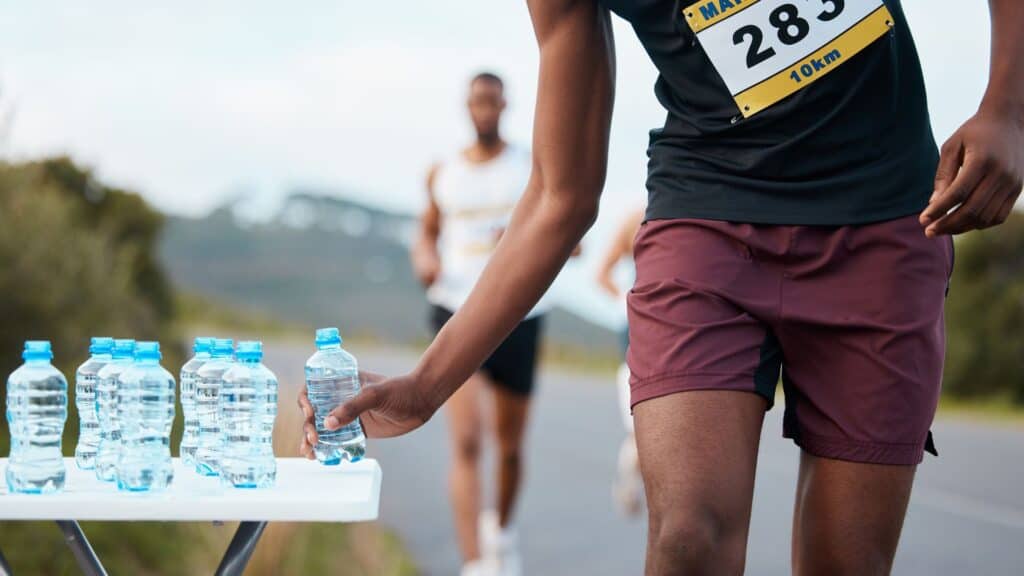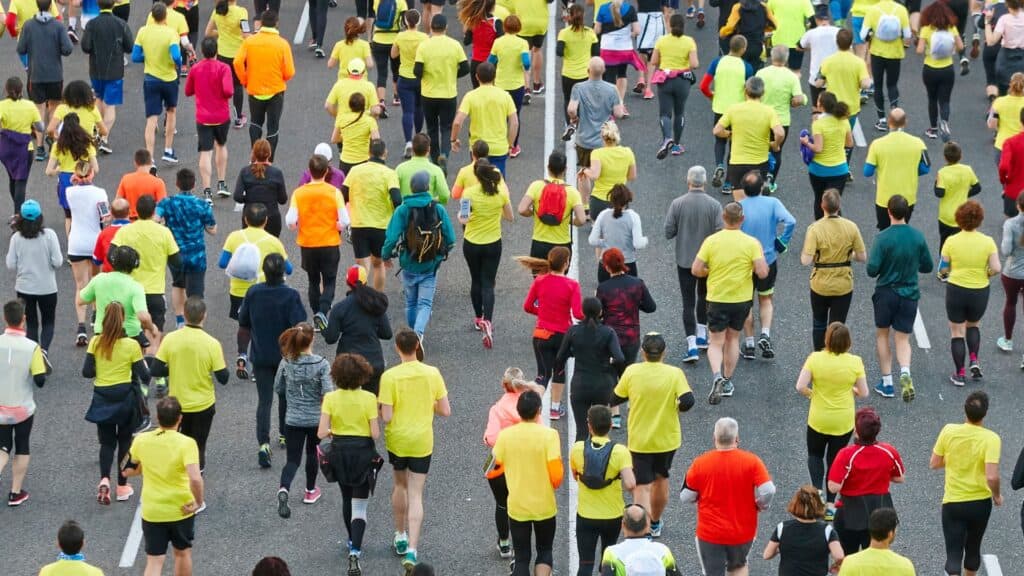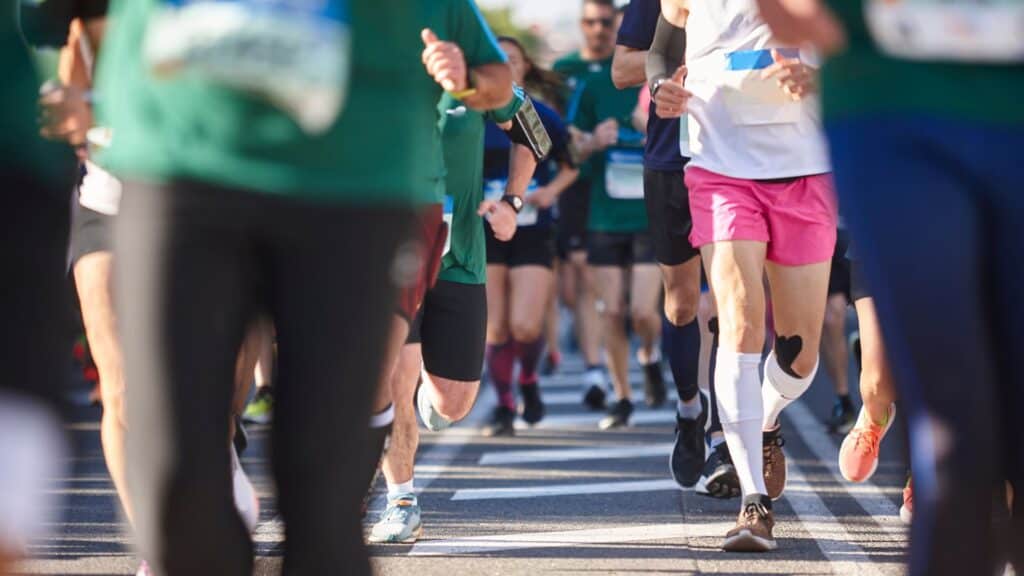Getting ready for the Soweto Marathon can be a mix of excitement and stress, regardless of whether it’s your first or tenth time running.
The morning of the race can be quite nerve-wracking, with runners leaving their comfortable homes or hotel rooms many hours before the race begins. As you make your way to the starting line, you might be wondering what to eat and drink before the race.
Runners often have similar questions: What should you consume in the hours leading up to the race? What should you bring to the starting line? How much should you eat and drink before heading to your designated starting area?
These concerns are entirely valid, as the right fueling strategy can significantly impact your race performance. There are popular options such as energy gels, sports drinks, bananas, oranges, bagels, and pretzels.
However, it’s crucial to remember that individual runners may have different preferences and requirements when it comes to fuel. What works well for one person might not work for another.
And most importantly, it’s advisable to avoid trying anything new on race day.
To get the most out of your Soweto Marathon experience, it’s a good idea to experiment with various fueling options during your training, especially on your long runs.
This will help you identify what works best for you based on your unique needs and goals. By doing so, you’ll feel more confident and prepared when race morning arrives.
In the following sections, we’ll dive deeper into the importance of proper nutrition and provide tips on how to fuel up before, during, and after the race. We’ll also look into what you can expect from the nutrition stations along the Soweto Marathon route.

What Nutrition To Expect Along The Soweto Marathon Route
During the Soweto Marathon, organizers strategically positioned multiple water and nutrition stations along the route to ensure runners have access to essential refreshments.
These stations are placed approximately every 3 km (1.9 miles), at the following key points: Ben Naude Street, Chris Hani Road, Modjaji Street, Klipspruit Valley Road (with two points along this road), Koma Street, Bolani Street (near Soweto Theatre), Mzilikatse Street (Mofolo Park), Vilakazi Street, Orlando Stadium, New Canada Road (with three points along this road), Main Reed Road, Colorado Street, Nasrec Road, and, finally, the finish line at FNB Stadium.
These stations are managed by dedicated volunteers who offer water, energy drinks, and sometimes snacks to help runners stay fueled and hydrated throughout the race.
Additionally, local vendors might also be present along the route, providing additional refreshments for the participants.
To perform at your best, stick to your planned hydration and fueling strategy. Only stop for beverages and fuel as you planned during training.
Now that you know what’s available, let’s discuss the best way to eat and drink during the Soweto Marathon.
Soweto Marathon Expo Essentials: A Participant’s Handbook
Your Soweto Marathon Hydration And Fueling Strategy
When preparing for the race, remember the saying “Nothing new on race day.” Stick to the eating and drinking routine you’ve practised during training.
The Week Before
In the week before the race, it’s important to stay on top of your fluid intake. Make sure you’re getting enough to keep your body hydrated and ready for peak performance.
A balanced diet with a good amount of carbohydrates will also be key to fueling your body for the upcoming race. To prevent any stomach discomfort, consider reducing your fibre intake a couple of days before the big day.
The Night Before
The night before the Soweto Marathon, it’s crucial to have a solid nutrition checklist ready.
- Ensure your breakfast is prepared and that you have a well-packed hydration pack for convenience during the race.
- Pack a pre-race snack, water bottle, and sports drink to keep you fueled and hydrated before the event. Sipping on a sports drink can help restore energy stores and provide extra electrolytes for optimal performance.
- Organize your race nutrition, including gels, bars, rehydrate options, and sports drinks, to have them easily accessible. Begin hydrating at least three to four hours before the race starts and maintain clear urine as a sign of proper hydration. Adjust your water intake accordingly based on the colour of your urine, as individual hydration needs can differ.
- Steer clear of alcohol to maintain proper hydration, as it can lead to increased urine production and potential dehydration during the race. Additionally, alcohol can hinder the body’s temperature regulation, potentially causing heat-related issues during the marathon.
The Race Morning
On the morning of the Soweto Marathon, it’s essential to fuel up adequately to ensure you have the energy to complete the race. Having breakfast about two hours before the start time is crucial to preserving your glycogen stores and preventing exhaustion during the race.
Examples of suitable pre-race breakfast options include bagels, banana bread, English muffins, granola with milk, low-fibre and low-sugar cereal, oats, pancakes with fruit, rice cakes, sweetcorn fritters, and toast with peanut butter.
What To Eat During The Soweto Marathon
Staying properly fueled during a marathon is essential to avoid depletion of glycogen, dehydration, and exhaustion. It’s crucial to stick with the nutrition and hydration strategies that you’ve practised during your long training runs.
During the marathon, your body primarily relies on the glycogen stored in your muscles for energy. Once these stores are depleted, your body begins to use the sugar stored in the blood and liver.
It’s important to consume sources of carbohydrates before this happens to maintain your energy levels throughout the race.
For the average runner, it’s recommended to consume 50-60 grams of carbohydrates per hour during the marathon.

However, the ideal amount may vary depending on your ability and weight. It’s important to start small and gradually increase your carbohydrate intake, as consuming too much too quickly can disrupt your gut.
For instance, Eliud Kipchoge, an elite marathoner, consumes up to 90 grams of carbohydrates per hour, but this level of intake should be approached gradually and cautiously during your training.
Here are some examples of food and drinks that are beneficial to consume during a marathon:
- Bananas
- Boiled baby potatoes
- Gummy bears
- Grapes
- Sports drinks (They supply sodium, carbohydrates and potassium)
- Sports gels, chews and bars (Make sure to consume them with water)
- White bread with honey
Post-Race Recovery
Ensure proper recovery fueling to facilitate muscle recovery and replenish glycogen stores. Aim to consume a post-race recovery option containing carbohydrates and protein within 30 minutes of finishing the race. If solid food seems challenging, consider opting for a liquid form of nutrition, such as chocolate milk, as an efficient and convenient choice to kick-start the recovery process.
Research indicates that chocolate milk can be a cost-effective and beneficial alternative to expensive recovery products. It can help prolong the time to training exhaustion and enhance muscle repair, both critical factors in the recovery process following exercise.
Stay adequately hydrated during the recovery period by regularly drinking fluids. When it comes to alcohol consumption, keep in mind that studies suggest that one beer isn’t detrimental to your recovery.
However, if you’re planning to have more than a couple of beers, it’s good to watch out for dehydration. It can slow down your recovery, especially if you’ve got more races or intense training coming up.
Excessive alcohol intake can hinder the absorption of essential nutrients like muscle glycogen and amino acids, which are crucial for muscle recovery and repair. Moreover, it can disrupt sleep quality, impede adaptation, and elevate heart rate, all of which can impede effective recovery after a race or intense training session.
Related: Why Chocolate Milk Is A Great Recovery Drink For Runners?
Now, let’s look at some tips to make the most of your race day strategy.
Nutrition Tips For TOP Running Performance OnRace Day
- Replenish with a Boost
- Stick to Regular Meals
- Energize Throughout Training
- Help Your Muscles Recover
- Make Your Plate Colorful
- Adapt to Training Levels
- Keep Up with Hydration
- Consult an Expert for Guidance
Replenish With A Boost
To prepare for a demanding morning training session, it’s a good idea to enjoy a slightly heartier dinner the night before.
While some individuals may be conscious of their carbohydrate intake, it’s important to provide your body with extra fuel to tackle those intense morning workouts.
Stick To Regular Meals
Maintaining a well-balanced diet is crucial for optimal runner nutrition, with carbohydrates serving as the primary energy source for running.
However, it’s important not to overlook the significance of adding protein to your main meals, as it facilitates recovery and promotes bone health.
To ensure your meals are well-structured, consider dividing your plate into three sections:
- one-half for a variety of nutrient-rich vegetables or fruits,
- one quarter for a starchy source like whole grains to sustain your energy levels, and,
- the remaining quarter for a lean protein source to support muscle recovery and overall well-being.
Make it a goal to include these well-rounded meals in your daily routine, and add in some protein-rich snacks between meals. Focus on whole foods and try to avoid processed options.
Choose high-quality sources of carbohydrates like whole grains, fruits, and vegetables, and stay away from heavily refined foods such as potato chips, refined biscuits, and heavily processed bars.
Energize Throughout Training
When you’re training, it’s really important to have a mix of protein and carbs in your meals. This not only helps you perform better during your workouts but also gets your stomach used to processing all that extra energy you’ll need on race day.
Think of your body’s glycogen stores as your main source of energy, like the fuel in a car’s tank. Normally, we’ve got about 60 to 90 minutes worth of this stored up, depending on how hard we’re training.
If we use up all this glycogen during training and don’t keep topping it up, we might end up feeling totally drained during our workouts. The tricky part is that refilling these stores isn’t something that happens right away.
It could take up to 72 hours to get them back to full, especially after intense workouts. So don’t be surprised if you feel pretty tired for a day or two after a tough run or race.
This Is How Long You Should Wait After Eating To Go For A Run
Help Your Muscles Recover
Right after your training, it’s very important to have some carbs and protein. This helps your muscles recover, fills back up your energy stores, and fixes up those tired muscles.
The first four hours after your workout are extra important for getting back the energy you lost during training. Having some carbs during this time helps get your energy levels back on track and gets your body on the road to recovery.
Besides carbs and protein, we runners (just like everyone else) need some extra vitamins and minerals like iron, vitamin D, calcium, and magnesium. Getting a good mix of colourful veggies can help with that.
Eating a variety of veggies isn’t just good for your nutrition, it’s good for your overall health too. So try to get in a mix of different coloured veggies to keep your body in top shape.
Make Your Plate Colorful
Vitamin C is crucial for our bodies and is essential. One of its key functions is to help make collagen, which keeps our bones, muscles, skin, and tendons strong.
It’s also a big helper when it comes to healing wounds, so it’s really important for our body’s natural recovery process.
To make sure you’re getting enough vitamin C and other essential nutrients, try to eat lots of different coloured fruits and veggies.
Eating a whole rainbow of foods isn’t just good for your health, it can also save you some cash by cutting down on the need for expensive supplements.
Adapt To Training Levels
Being a runner means dealing with all sorts of training sessions, each needing its special approach.
Whether it’s a long 3-hour run, a quick 45-minute interval workout, or an easy-breezy 45-minute recovery run, each one asks something different from your body, and the same goes for what you should eat.
To get the most out of your training and give your body the support it needs, it’s important to match what you eat with the kind of workout you’re doing.
Different workouts call for different things. The longer and tougher ones, like the 3-hour run or interval workouts, might need more carbs to keep you going and top up your energy stores.
But for the shorter, easier runs like recovery sessions, you might not need as much. So, remember to adjust what you eat to fit the kind of workout you’re doing.

Keep Up With Hydration
Many runners think about drinking enough water mainly when it’s hot outside and they’re sweating more. But no matter where you live, stay hydrated all year round.
Water plays a critical role in various bodily functions. It facilitates the transportation of crucial nutrients to active tissues, assists in the elimination of waste products, and helps regulate body temperature.
Being properly hydrated is key to keeping your body working the way it should, which affects how you run.
Whether it’s hot or cold, staying hydrated is important. When it’s hot, drinking enough water helps you avoid overheating. And in the cold, it helps your body stay warm and keeps your performance up.
It’s not just about being dehydrated; drinking too much can be a problem too, especially during exercise. Finding the right balance is key to making sure your body does its best during your workout or race.
Whether you’re training or getting ready for a big race, making sure you’re hydrated is super important. Check out our marathon hydration strategy to help you get ready for the big day!



Comments are closed.